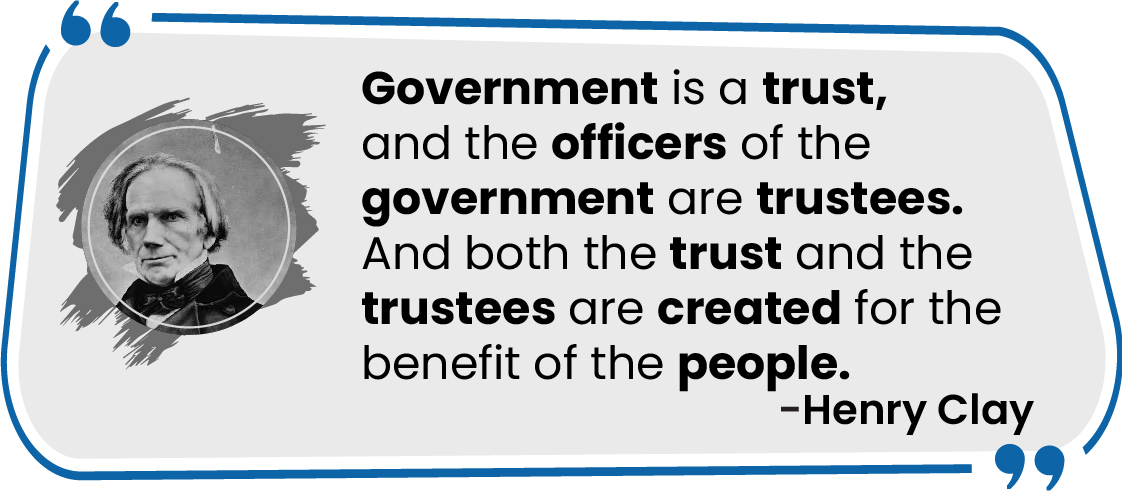Introduction
In recent times, allegations of political misuse on several public institutions like Election Commission of India, Enforcement Directorate, Central Bureau of Investigation etc. have raised concerns about erosion of trust in India's public institutions. The UN's World Social Report 2025 highlights a broad decline globally in institutional trust since the start of the 21st century. Today, over half of the global population has little or no trust in their government says the UN report citing survey data collected between 1995 and 2022.
What is meant by Trust?

- OECD defines trust as "a person's belief that another person or institution will act consistently with their expectation of positive behaviour."
- Trust is a key component of the social contract, making it important for governance to be guided by a clear understanding of the nature of trust, along with deep insight into its drivers and consequences.
- Types of Trust:
- Horizontal Trust: Trust that members of a community have in each other.
- Vertical Trust: Trust that members of a community have in the institutions presiding over that community.
- Social Trust: It is a generalized trust, which is not directed at specific people for a specific purpose. It is trust, confidence, or faith in strangers and reflects long-term optimism.
- Political Trust: It is confidence in institutions and its actors (e.g., the executive, legislative, judiciary, bureaucracy, police, media, private sector or business, NGOs etc.)
Stakeholders and their Interests in maintaining Trust in Public Institutions
Stakeholder | Interest |
Citizens | Efficient delivery of public services, public participation, higher levels of subjective well-being (increased happiness and longevity), democratic life, regime stability |
Government Institutions and officials | Proper policy making and implementation, ensuring legitimacy, policy compliance, effective law enforcement, smoother governance without excessive coercion |
Civil Society & Media | Interest in freedom of expression, advocacy for people's rights, |
Private Sector | Predictable regulations, contract enforcement, fair competition, reduced corruption, business-friendly environment, encouraging entrepreneurship |
Reasons behind erosion of Trust in Public Institutions
- Non-performance of administrative structures: E.g., poor service quality, lack of responsiveness, subjective and negative abuse of authority. (2nd ARC)
- Widespread Economic Insecurity: Providing economic security is a key role of the state and its institutions and a foundation of the social contract.
- Economically insecure individuals (e.g., lower-income, less-educated groups) report significantly lower institutional trust compared to more secure groups. (UNDESA)
- Political Exclusion: Limited political influence among the marginalized sections hinders their ability to demand redistributive policies or improved services.
- Scandals and Corruption: It undermines public trust by suggesting that public institutions are not acting in the best interests of the people or the country.
- Disinformation and Social Media: Social media can emphasize institutional failures (real or perceived), enable sophisticated targeting of information campaigns, manipulate views, and affect trust in the legitimacy of election outcomes.
- Inefficient Judicial systems: It impairs rule of law, and hampers remedies in case of grievances with public institutions.
Major Drivers of Trust in Public Institutions
Competencies | |
Reliability
|
|
Responsiveness
|
|
Values | |
Transparency
|
|
Integrity |
|
Fairness |
|
Measures to rebuild/improve Trust in Public Institutions
- Foster citizen engagement and participation: E.g. promoting open and inclusive policymaking through measures like Social Audit.
- Consistent implementation and results: Improving citizens' experiences through day-to-day interactions in delivery of public services. E.g., Direct Benefit Transfer.
- Promoting transparency and communication: Ensuring data used for policy making is accessible and openly verifiable, e.g., through government dashboards.

- Ensuring ethical governance: Integrity of action, attention to equity, and focus on marginalized groups are critical for ethical behaviour and the public trust.
- Independent anti-corruption mechanisms:E.g., Lokpal and Lokayukta Act, 2013 mandated the establishment of Lokpal at union level and Lokayukta at state level to deal with complaints relating to corruption against certain public functionaries.
- Strengthening Institutional Frameworks: A harmonious and cooperative relationship between parliament and the executive, along with independent judiciary is key to building trust.
- Addressing Misinformation and Leveraging Technology: Governments need to proactively tackle misinformation and disinformation by adoption of new governance models to ensure that information ecosystems support democratic debate and discussion. E.g., establishing Fact Checking Units.
Conclusion
Trust is integral to the functioning of any society. Trust in government and its institutions is a necessary precondition for representative democracy. The erosion of trust in government is thought to indicate "the crisis of democracy" with direct and severe consequences for the quality and ability of representative democracy, its institutions, and its actors.
Check your Ethical AptitudeYou are an honest IAS officer, recently appointed as the Municipal Commissioner of a rapidly urbanizing city struggling with inequality and weak infrastructure. Public trust in the municipal body is already low, as your predecessor was removed on corruption charges. Within days of your posting, a newly built flyover collapses during heavy rains in a low-income area, causing deaths, injuries, and destruction of homes and shops. The tragedy fuels deep public anger and distrust in institutions. The crisis is worsened by spread of misinformation on social media. Honest staff feel demoralized and unfairly blamed, slowing relief work. Meanwhile, social media narratives amplify the credibility crisis of the municipal administration. The State Chief Secretary directs you to act sensitively but firmly, ensuring both relief and restoration of public confidence. Based on the above narration of the case, answer the following: (a) Identify ethical issues and dilemmas arise in this case, especially regarding institutional trust, (b) What immediate and long-term steps would you take to manage the crisis and rebuild institutional credibility? (c) Social media is being misused to spread disinformation. How would you leverage the same platform to engage positively with citizens and restore trust in the administration? |




